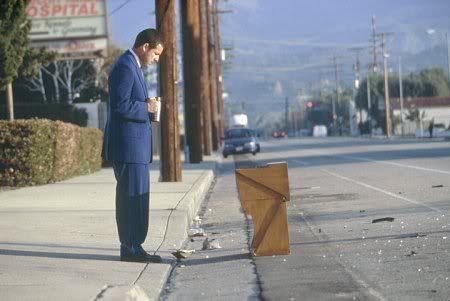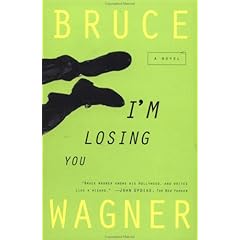
Laura-Marie Taylor has been a friend of mine since we met when we were teenaged aspiring writers at the
California State Summer School for the Arts. Geography separated us then; she was from the Central Coast and I from SoCal, but we still managed to visit with each other from time to time throughout high school and college, and now that we are separated by 3000 miles, the internet has brought us together once again. It's online that I discovered Laura-Marie's blog,
Dangerous Compassions, and also one of her zines,
functionally ill: adventures with mental health, that offers a personal view of mental illness, its treatment, and implications in one person's daily life.
What struck me when I first started reading
functionally ill was how much my ideas about mental illness were formed by books and movies that portray sufferers in dramatic extremes:
One Flew Over the Cuckoo's Nest, Girl Interrupted, Prozac Nation, etc.
functionally ill really got me to thinking about the
reality, that there are millions of people are living with mental illness, holding jobs, going to the grocery store, etc. We just don't get to see accounts of the day-to-day experience. I found
functionally ill's treatment of the subject really fascinating, and I wanted to open up a conversation with its creator about what inspired her. So what follows is our interview, conducted over email last week.
AJM: Can you talk about whether you've thought at all about where your zine fits into the pantheon of mental illness literature? Maybe you could also talk a little about what inspired you to start the zine in the first place.LMT: I don't consider
functionally ill as having a place in the mental illness literature pantheon, but I do see it as having a place in the zine world. Years ago I read a zine by Megan Gendell called
Clark 8 which is an account of a stay at the mental hospital: articulate, sharp, intimate. I will always be grateful to Megan for showing me what's possible in mental illness writing. There's a whole genre of mental illness zines, mostly about depression, anxiety, and self injury. I'm happy to find myself within this genre and believe I have something to give.
As for what inspired me to start the zine in the first place, I wrote issues one and two with an intense need to communicate my truth. Another reason was to shed light on a shady topic. Friends wanted to know what my voices say, for example, and I was happy to provide that information. I've been creating zines for a long time, and it's natural now. Also, I write
functionally ill for my mom. She readseach issue multiple times. I feel safer knowing that other people understand my life. I'm expanding the community of people who care about me. And I've received the most moving feedback from other mentally ill people and their family members.
AJM: Another idea in your zine that really intrigues me is the idea of "identifying" as a mentally ill person in the way that someone might identify as gay. You write about how the ability to take up such a mantle is something of a relief, because it allows a person to stop having to pass for somebody else's idea of "normal," whatever that might mean. The other way of looking at such an identification is, of course, political. The Icarus Project, for instance, critiques the concept of mental illness as a dysfunction rather than a different way of being in the world. How do you feel about such constructs?LMT: I struggle with these constructs. Ideally, everyone should be out about everything. So many people are suffering in closets of isolation. Telling the truth about our lives is a step toward authentic experience. Also, a good example helps other people feel okay about telling their truths. We discover that everyone is unusual in their own way, and life becomes more refreshing.
I remember after I wrote issue one of functionally ill and gave it to friends. A week later, my friend Paul said, "So, you're crazy."
I said, "Yeah."
"Me too," he said. "Everyone's crazy."
Later he and I had another conversation about it. I asked him, "Do you hear voices too?"
He said, "No. I wish I did. That would be cool."
In my life, it's mostly fine to hear voices: they're just chatty. They're not a big deal. But some days it's really a burden, the days the voices get screamy in particular. It's scary to have something going on in my head that's disturbing and I can't make it stop.
I told Paul that we all draw the line somewhere, and I would say someone's actually mentally ill when she's dangerous, to others or to herself.
"You don't seem dangerous to me," Paul said. And I don't seem dangerous to most people. Does everyone have a secret life? I've spent my whole life refining my wellness performance. Some days I do a better job than others.
I guess everyone has performances. But I never gave Paul issues two or three.
AJM: Many of the history's greatest artists and writers, like Van Gogh and Emily Dickinson, have been "diagnosed" as being mentally ill. What do you think about the role mental illness plays in artistic creation—a means of insight or a hindrance? And how do you think medication might interact with the thought and creativity required to create writing or art?LMT: Sometimes I want to go off all my medications and be crazy because my best art has been created during extreme emotional states. Also, when I'm manic, I write with an incredible urgency. I feel compelled to stay up all night writing: issue two of functionally ill was written during a manic episode.
Mental illness is a hindrance to making art in that it causes artists to kill themselves. If I could get away with it, I would live without medication, but I don't want to die. When I made the decision to try mainstream methods, it was a last resort, and medication is part of that package.
As for what role mental illness plays in artistic creations, that's a fascinating question. I don't think it's a coincidence. It must have to do with extremes. My favorite bipolar hero is my favorite novelist Virginia Woolf. I actually don't know a lot about her life besides a few basic facts—a little about her relationship with her husband and her death. I want to be like her in all the good ways and not be like her in all the bad ways.
Check out past, current and future issues of functionally ill. For more information write to: robotmad at gmail dot com.
 The streets are empty and filled with whimsy. Paul Thomas Anderson made me think this, Punch Drunk Love. I remember thinking, this is the way Southern California feels: flimsy, spacious, bruisey pastels. A little like a forgotten backlot.
The streets are empty and filled with whimsy. Paul Thomas Anderson made me think this, Punch Drunk Love. I remember thinking, this is the way Southern California feels: flimsy, spacious, bruisey pastels. A little like a forgotten backlot. They have a vastly superior food scene. Many things have cause me to think this. Going for Okonomiyaki (savory Japanese pancakes) with a friend and her father when I was a child. My sister's hole in the wall vegetarian Indian place in a strip mall near her house. Reading Chowhound posts about Taco Trucks. Jonathan Gold's expeditions. Diddy Reese.
They have a vastly superior food scene. Many things have cause me to think this. Going for Okonomiyaki (savory Japanese pancakes) with a friend and her father when I was a child. My sister's hole in the wall vegetarian Indian place in a strip mall near her house. Reading Chowhound posts about Taco Trucks. Jonathan Gold's expeditions. Diddy Reese. Despite NY's superior literary heritage, Angelenos have Miranda July. How does she do what she does without being totally annoying? I don't know. Why can't I be more like her? The jury's still out.
Despite NY's superior literary heritage, Angelenos have Miranda July. How does she do what she does without being totally annoying? I don't know. Why can't I be more like her? The jury's still out. The music scene rules. Again, this started in childhood, Sean and I driving to the Roxy in his Ford Escort, going to see Lush or the Pixies at the Hollywood Palladium. Now I listen to Morning Becomes Eclectic every chance I get. In New York, seeing a show invariably a hassle; in L.A., enchanting singer-songwriters grow on palm trees. They work at Book Soup.
The music scene rules. Again, this started in childhood, Sean and I driving to the Roxy in his Ford Escort, going to see Lush or the Pixies at the Hollywood Palladium. Now I listen to Morning Becomes Eclectic every chance I get. In New York, seeing a show invariably a hassle; in L.A., enchanting singer-songwriters grow on palm trees. They work at Book Soup.










